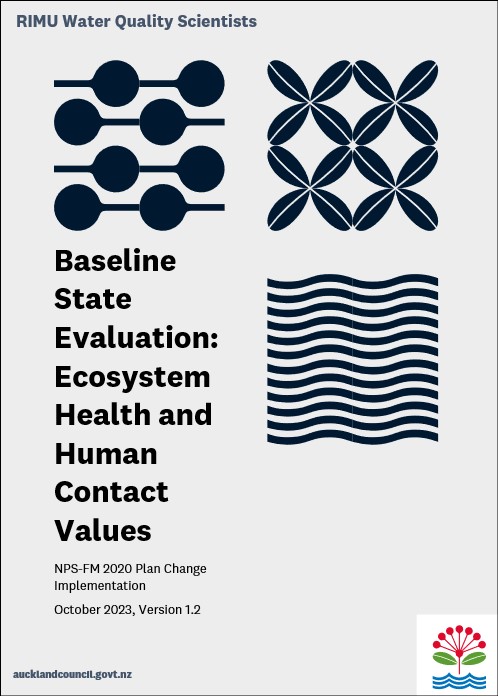Baseline state evaluation: ecosystem health and human contact values. NPS-FM 2020
Author:
Research and Evaluation Unit, RIMU water quality scientistsSource:
Auckland Council Research and Evaluation Unit, RIMUPublication date:
2023Topics:
EnvironmentExtract from the Introduction:
The National Policy Statement for Freshwater Management 2020 (as amended February 2023, NPS-FM) forms part of the Government’s Essential Freshwater reform package which outlines the statutory direction for freshwater management across New Zealand. The main aims of this reform package are to prevent further degradation of New Zealand’s freshwater ecosystems, improve water quality within five years, and address past damage to return freshwaters to a healthy state within a generation (20-30 years). The NPS-FM is underpinned by the fundamental concept of Te Mana o te Wai. Te Mana o te Wai prioritises the health and well-being of freshwater systems over provisions for human health needs and other forms of utilisation. Te Mana o te Wai, and other components of the NPS-FM, are managed through a National Objectives Framework (NOF) which requires Auckland Council to identify values associated with waterbodies in the region and set ambitious but achievable desired environmental outcomes and objectives.
Under the NOF, the NPS-FM identifies four compulsory national values (Appendix 1A of the NPS-FM) and 22 accompanying compulsory national attributes (Appendix 2A and 2B of the NPS-FM) which must be managed to safeguard and promote the health of the region’s lakes, and rivers and streams (collectively referred to as rivers henceforth). The four compulsory national values are:
- Ecosystem health – refers to the maintenance of ecological processes, such that the waterways support diverse communities of native plants and animals. This value includes five biological and physical components that are supported by 19 compulsory attributes (Table 1).
- Human contact – refers to the way people connect with the water through a range of recreational activities, such as swimming, boating, and fishing. This value is supported by three compulsory attributes (Table 1).
- Threatened species – refers to the maintenance of critical habitats and conditions required to sustain populations and enable the recovery of threatened native plants and animals.
- Mahinga kai – refers to native freshwater species that are traditionally used for food, tools, and other customary practices, as well as the places they are found and how they are gathered.
Elevated stream temperature and concentrations of several metals have been identified as key stressors in urban streams in Auckland. Regional attributes for temperature and bioavailable copper and zinc are also included in this iteration of understanding baseline state for our region. Auckland Council has identified these additional attributes which will sit under the value of ecosystem health for rivers.
The NPS-FM provides a long-term framework for achieving desired environmental outcomes through direct involvement with mana whenua, including the use of mātauranga Māori, and consultation with community and other regional stakeholders. To inform management decisions and enable constructive consultation it is important to determine a starting point or baseline state for each attribute. Establishing a baseline state provides context to understand the current condition of Auckland’s freshwater environments and to identify where degradation or improvement has occurred. Baseline state information will also help to inform remediation and management targets that are relevant to the systems in question, enable progress towards such targets to be monitored, and inform choices about maintaining or improving the outcomes for our waterbodies. Furthermore, establishing baseline state is a prerequisite step required by the NPS-FM (clause 3.10) to set target attribute states that at least maintain, and in some cases improve, on baseline state.
The purpose of this report is to detail the baseline state of the compulsory attributes for ecosystem health and human contact values as detailed in Appendix 2A and 2B of the NPS-FM based on state of the environment monitoring data. Additional regional attributes pertaining to these values and the requirements outlined in clause 3.13 of the NPS-FM regarding nutrient management are also included.
No additional non-compulsory attributes have been assessed in this report for the compulsory values of threatened species and mahinga kai and the water quantity component of the compulsory ecosystem health value, while policy direction is sought on how these will best be applied in the Auckland region . Baseline state for Escherichia coli (E. coli), an indicator of faecal pollution in relation to primary contact sites, and dissolved oxygen specifically below point sources, are not included in this report, and are being progressed by other parts of council’s NPS-FM programme.
This report will support the consultation process and help Auckland Council to meet its obligations under clause 3.10 of the NPS-FM and inform implementation of the NOF process (clause 3.7 of the NPS-FM). The report is a working document and will be updated as other compulsory or regional values and attributes are incorporated into the work programme, and as any new information becomes available prior to plan notification. For a summary of the results reported here, please see the “Summary of out identified baseline state” section on page 47. ...
Auckland Council, October 2023
*****
Published to support consultation on implementing the National Policy Statement for Freshwater Management in Auckland. Detailed consultation information is available on the Auckland Council consultation website Ak Have Your Say. Submissions closed 4 December 2023.
See also
Implementing the National Policy Statement for Freshwater Management 2020 in Auckland
